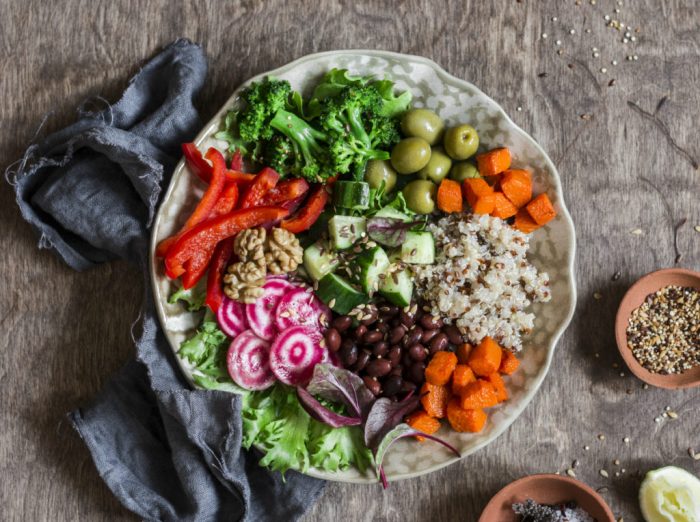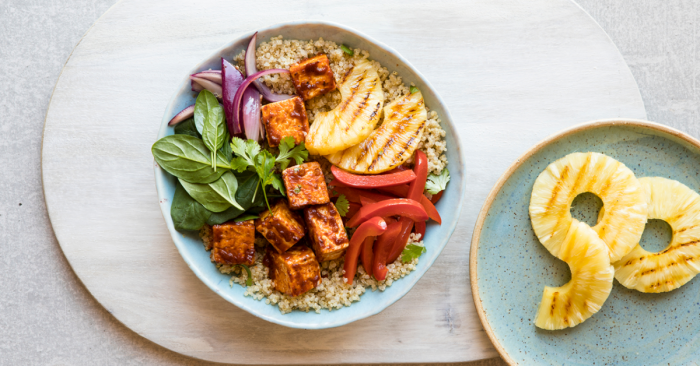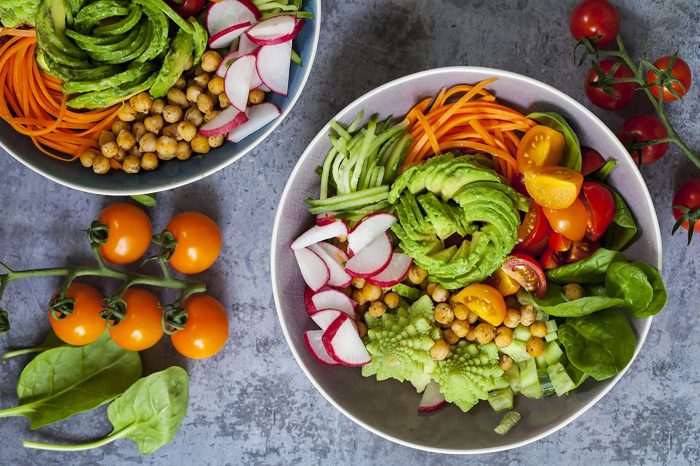Embark on a culinary adventure with vegan things to eat, where plant-based wonders ignite taste buds and nourish bodies. From vibrant fruits to hearty legumes, this guide unlocks the secrets of a vibrant and ethical vegan lifestyle.
Discover the nutritional powerhouses that fuel a healthy vegan diet, explore tantalizing recipes that redefine plant-based cuisine, and uncover the art of seamless vegan substitutions. Whether you’re a seasoned vegan or a curious explorer, this comprehensive guide empowers you to embrace the joys of plant-based living.
Vegan Foods
A vegan diet is one that excludes all animal products, including meat, dairy, eggs, and honey. This type of diet can be healthy and nutritious, as it is rich in fruits, vegetables, legumes, nuts, seeds, and whole grains. These foods are all packed with essential vitamins, minerals, and antioxidants that are important for good health.
Here is a comprehensive list of vegan foods, along with their nutritional value and how they can be incorporated into a healthy vegan diet:
Fruits
- Apples:Apples are a good source of fiber, vitamin C, and potassium. They can be eaten fresh, juiced, or baked into desserts.
- Bananas:Bananas are a good source of potassium, vitamin B6, and fiber. They can be eaten fresh, added to smoothies, or used in baking.
- Berries:Berries are a good source of antioxidants, vitamin C, and fiber. They can be eaten fresh, frozen, or added to smoothies.
Vegetables
- Broccoli:Broccoli is a good source of fiber, vitamin C, and vitamin K. It can be eaten raw, steamed, or roasted.
- Carrots:Carrots are a good source of vitamin A, vitamin K, and fiber. They can be eaten raw, cooked, or juiced.
- Spinach:Spinach is a good source of iron, vitamin K, and folate. It can be eaten raw, cooked, or added to smoothies.
Legumes
- Beans:Beans are a good source of protein, fiber, and iron. They can be cooked in a variety of ways, such as soups, stews, and salads.
- Lentils:Lentils are a good source of protein, fiber, and iron. They can be cooked in a variety of ways, such as soups, stews, and salads.
- Peas:Peas are a good source of protein, fiber, and vitamins A and C. They can be eaten fresh, frozen, or canned.
Nuts
- Almonds:Almonds are a good source of protein, fiber, and healthy fats. They can be eaten raw, roasted, or added to salads and desserts.
- Cashews:Cashews are a good source of protein, fiber, and healthy fats. They can be eaten raw, roasted, or added to salads and desserts.
- Walnuts:Walnuts are a good source of protein, fiber, and healthy fats. They can be eaten raw, roasted, or added to salads and desserts.
Seeds, Vegan things to eat
- Chia seeds:Chia seeds are a good source of fiber, protein, and omega-3 fatty acids. They can be added to smoothies, oatmeal, or yogurt.
- Flax seeds:Flax seeds are a good source of fiber, protein, and omega-3 fatty acids. They can be ground and added to smoothies, oatmeal, or baked goods.
- Hemp seeds:Hemp seeds are a good source of protein, fiber, and healthy fats. They can be eaten raw, roasted, or added to smoothies and salads.
Whole Grains
- Brown rice:Brown rice is a good source of fiber, protein, and vitamins. It can be cooked and eaten as a side dish or used in soups and stews.
- Quinoa:Quinoa is a good source of protein, fiber, and iron. It can be cooked and eaten as a side dish or used in salads and soups.
- Whole wheat bread:Whole wheat bread is a good source of fiber, protein, and vitamins. It can be eaten as a side dish or used in sandwiches and wraps.
Vegan Substitutions
Vegan cooking and baking can be a rewarding and delicious experience with the right substitutions. Understanding how to replace non-vegan ingredients with plant-based alternatives is key to creating satisfying vegan dishes.
Let’s dive into some common non-vegan ingredients and their effective vegan substitutes, along with tips for using them in cooking and baking.
Eggs
- Flax eggs:Combine 1 tablespoon ground flaxseed with 3 tablespoons water. Let it sit for 5 minutes until it thickens.
- Chia eggs:Combine 1 tablespoon chia seeds with 3 tablespoons water. Let it sit for 10 minutes until it gels.
- Mashed banana:1 ripe banana can replace 1 egg in baking. It adds moisture and sweetness.
Dairy Milk
- Soy milk:A versatile substitute with a neutral flavor, it can be used in cooking and baking.
- Almond milk:A nutty-flavored milk, it’s great in smoothies and baking.
- Oat milk:A creamy and mild-tasting milk, it’s a good choice for baking and cereal.
Butter
- Vegan butter:Commercially available vegan butter can be used as a 1:1 replacement for dairy butter.
- Coconut oil:Solid at room temperature, it can be substituted for butter in baking and cooking.
- Olive oil:A healthy and flavorful oil, it can be used in cooking but may not be suitable for baking.
Honey
- Maple syrup:A natural sweetener with a slightly caramel-like flavor, it’s a good replacement for honey.
- Agave nectar:A low-glycemic sweetener with a neutral flavor, it’s a versatile substitute for honey.
- Date syrup:Made from dates, it has a rich and sweet flavor, suitable for baking and drizzling.
Vegan Meal Planning

Meal planning is crucial for vegans to ensure they consume a balanced and nutritious diet that meets their daily nutritional needs. Planning meals ahead of time helps vegans avoid impulsive choices and make healthier eating decisions.
Sample Vegan Meal Plan for a Week
Breakfast
Monday
Oatmeal with berries and nuts
Embracing a vegetarian lifestyle offers a plethora of health benefits, but it’s not without its concerns. One key aspect to consider is nutrient deficiencies, particularly when it comes to iron and vitamin B12. To ensure a well-balanced diet, it’s essential to seek guidance from healthcare professionals or registered dietitians.
Additionally, it’s worth exploring reliable sources such as vegetarian diet concerns to stay informed about the potential challenges and how to mitigate them effectively.
Tuesday
Tofu scramble with vegetables
Wednesday
Smoothie with fruits, vegetables, and plant-based milk
Thursday
Adopting a vegetarian diet may seem like a healthy choice, but it’s essential to be aware of vegetarian diet concerns. The lack of animal products can lead to deficiencies in certain nutrients, such as iron, vitamin B12, and calcium.
Consulting with a healthcare professional before embarking on a vegetarian journey is crucial to ensure a balanced and nutritious diet.
Whole-wheat toast with avocado and tomatoes
Friday
Breakfast burrito with beans, vegetables, and salsa
Saturday
Pancakes with fruit syrup
Sunday
Waffles with berries and whipped coconut cream Lunch
Monday
Salad with grilled tofu, vegetables, and quinoa
Tuesday
Lentil soup with whole-wheat bread
Wednesday
Sandwich on whole-wheat bread with hummus, vegetables, and sprouts
Thursday
Leftover dinner from the previous night
Friday
Bean and vegetable tacos
Saturday
Veggie burger with sweet potato fries
Sunday
Pasta salad with vegetables and chickpeas Dinner
Monday
Black bean tacos with brown rice
Tuesday
Vegetable stir-fry with tofu or tempeh
Wednesday
Lentil shepherd’s pie
Thursday
Pasta with marinara sauce and vegetables
Friday
Pizza with whole-wheat crust and vegetable toppings
Saturday
Vegetable curry with brown rice
Sunday
Roasted vegetables with quinoa Snacks
- Fruits (bananas, apples, berries)
- Vegetables (carrots, celery, cucumbers)
- Nuts and seeds
- Hummus with whole-wheat pita bread
- Plant-based yogurt with fruit
Tips for Meal Prepping and Storing Vegan Meals
* Prepare meals in advance on weekends or evenings to save time during the week.
- Cook in bulk and freeze leftovers for easy grab-and-go meals.
- Store fruits and vegetables in the refrigerator for freshness.
- Pack lunches and snacks in reusable containers to reduce waste.
- Consider using a slow cooker or Instant Pot to cook meals while you’re away.
Vegan Nutrition
Vegan nutrition is crucial for maintaining optimal health. Vegans must ensure they consume all essential nutrients from plant-based sources.Vitamins B12, iron, calcium, and omega-3 fatty acids are particularly important for vegans. Vitamin B12 is primarily found in animal products, so vegans must obtain it from fortified foods or supplements.
Iron is abundant in legumes, leafy green vegetables, and fortified cereals. Calcium is present in fortified plant milks, leafy green vegetables, and tofu. Omega-3 fatty acids can be obtained from flaxseed, chia seeds, and walnuts.
Vegan Lifestyle: Vegan Things To Eat

Embracing a vegan lifestyle offers a multitude of benefits, encompassing improved health, environmental sustainability, and ethical considerations. Adopting a plant-based diet can significantly enhance overall well-being, reduce the risk of chronic diseases, and promote a healthier planet.
Transitioning to a vegan diet requires careful planning and gradual implementation. Start by incorporating more plant-based meals into your weekly routine, gradually reducing animal-based products. Explore a wide variety of vegan recipes and experiment with different flavors and textures to maintain a balanced and enjoyable diet.
Challenges and Rewards
Adopting a vegan lifestyle can present challenges, such as navigating social situations or finding suitable dining options. However, the rewards far outweigh the obstacles. The improved health benefits, reduced environmental impact, and ethical alignment with animal welfare make the journey worthwhile.
Ending Remarks

As you delve into the world of vegan things to eat, remember that it’s a journey of health, compassion, and culinary exploration. With every bite, you’re not only nourishing your body but also making a positive impact on the planet and its inhabitants.
Embrace the transformative power of plant-based living and unlock a world of flavors that will redefine your dining experiences.
FAQ Explained
What are the key nutrients vegans need to be aware of?
Vitamin B12, iron, calcium, and omega-3 fatty acids are essential nutrients for vegans to monitor and ensure adequate intake.
How can I ensure I’m getting enough protein on a vegan diet?
Legumes, tofu, tempeh, nuts, and seeds are excellent sources of plant-based protein that can meet your daily requirements.
Is it challenging to transition to a vegan diet?
While it requires some planning and adjustments, transitioning to a vegan diet can be manageable with the right resources and support. Gradually incorporating plant-based foods into your meals can ease the process.